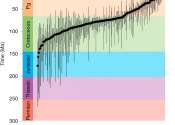Slow growth the key to long term cold sensing
Plants have to interpret temperature fluctuations over timescales ranging from hours to months to align their growth and development with the seasons.

Plants have to interpret temperature fluctuations over timescales ranging from hours to months to align their growth and development with the seasons.
Plants & Animals
Jul 15, 2020
0
106

A multidisciplinary team of researchers at MIT and in Spain has found a new mathematical approach to simulating the electronic behavior of noncrystalline materials, which may eventually play an important part in new devices ...
Condensed Matter
Jun 22, 2012
0
0
Two decades ago a renowned statistician described a computer data set of 1 billion bytes as "huge" and 10 trillion bytes as "ridiculous."
Computer Sciences
May 14, 2009
0
0

The Internet, motorways and other transport systems, and many social and biological systems are composed of nodes connected by edges. They can therefore be represented as networks. Scientists studying diffusion over such ...
General Physics
Jul 15, 2013
0
0

Biologists at Cold Spring Harbor Laboratory (CSHL) are using a mathematical approach developed in CSHL Assistant Professor David McCandlish's lab to find solutions to a diverse set of biological problems. Originally created ...
Molecular & Computational biology
Oct 4, 2021
0
83

Whether it protects space satellites or sequesters nuclear waste, scientists want to understand tiny features that could significantly alter how a material behaves. Locating microscopic defects can be done with powerful microscopes, ...
Materials Science
Feb 7, 2012
0
0
A newly developed mathematical model that figures out the best strategy to win the popular board game CLUE© could some day help robot mine sweepers navigate strange surroundings to find hidden explosives.
Computer Sciences
Jan 27, 2009
0
0

Emeralds, rubies and the like are referred to as colored gemstones by experts. They sparkle and shine with varying intensity, depending on the cut. A new machine can achieve the best possible cut and extract up to 30 percent ...
Engineering
Jun 25, 2009
1
0
A new study has shed light on the process by which fruit flies develop with their body proportions remaining constant. The study, conducted by the research group of Professor Markus Affolter at the Biozentrum of the University ...
Plants & Animals
Oct 25, 2011
0
0

Flowers may look delicate—but flowering plants, what scientists call angiosperms, are one of the most successful evolutionary organisms on the planet. Including more than 350,000 known species, they dominate the ecological ...
Evolution
Apr 10, 2024
1
1